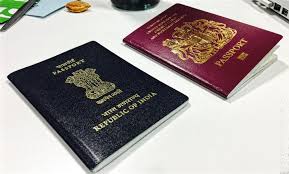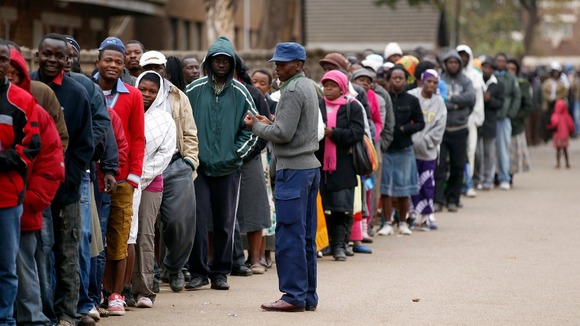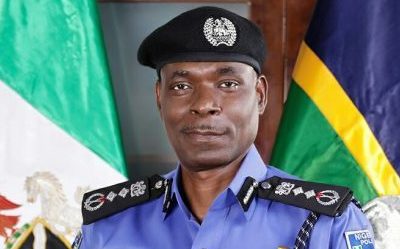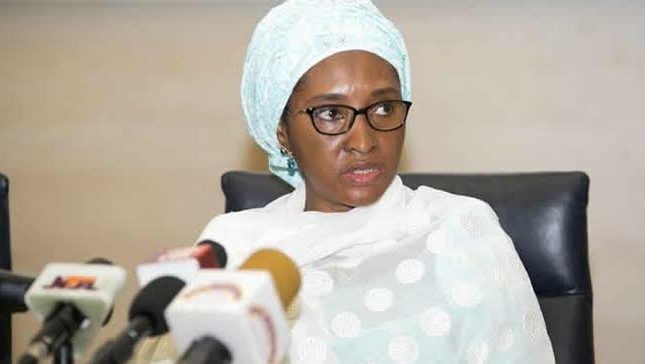Voters in Zimbabwe are going to the polls in the country’s first election without long-time leader Robert Mugabe’s name on the ballot.
The country’s founding president, Mr. Mugabe, was ousted in a coup last year after almost four decades in power.
The main contenders in the presidential vote are incumbent Emmerson Mnangagwa of the ruling Zanu-PF party, and opposition leader Nelson Chamisa.
Parliamentary and local elections are also taking place on Monday.
Polls give Mr. Mnangagwa, 75, a narrow lead over his 40-year-old rival, who leads the Movement for Democratic Change (MDC).
On Monday ex-president Robert Mugabe – who first came to power after independence in 1980 – said he would not vote for his successor.
The country is expecting a high turnout of first-time voters, where the youth vote is expected to be key.
Almost half of those registered are under the age of 35.
Hundreds of international observers have been deployed to ensure the vote goes smoothly, but the opposition has repeatedly alleged irregularities in the voter roll.
They have also expressed concern over the security of ballot papers and voter intimidation in mainly rural areas.
The election follows decades of repressive rule which has brought severe economic challenges to Zimbabwe.
These include issues of investment, education, healthcare and jobs – some estimates suggest that the unemployment rate is as high as 90%.
President Mnangagwa, who is known as “the crocodile” because of his political shrewdness, has promised to deliver jobs and is seen as open to economic reforms.
He has survived several assassination attempts blamed on supporters of Mr. Mugabe.
Mr. Chamisa, who became an MP at the age of 25, could become Zimbabwe’s youngest president if elected.
He has promised to rebuild the country’s devastated economy, but been criticised for making extravagant promises – such as the introduction of a high-speed bullet train and bringing the Olympics to Zimbabwe.
But the qualified pastor will have been buoyed by comments Mr. Mugabe made during a surprise news conference on Sunday.
Mr. Mugabe, who resigned in November after the military took control of the country, refused to support his former ally Mr. Mnangagwa.
“I cannot vote for those who tormented me,” he said. “I hope the choice of voting tomorrow will thrust away the military government and bring us back to constitutionality,” he said.
When asked by the BBC’s Fergal Keane if he would like to see Mr. Chamisa win, Mr. Mugabe, 94, indicated that he was the only viable candidate.
In response to the comments, Mr. Mnangagwa accused his former boss of making a deal with the opposition.
“It is clear to all that Chamisa has forged a deal with Mugabe, we can no longer believe that his intentions are to transform Zimbabwe and rebuild our nation,” he said.
Mr. Mugabe also denied that, as president, he had planned to hand the leadership to his wife, Grace, saying it was “utter nonsense.”
………………………………………………………………
New York Times to Trump: Don’t call reporters enemies of the people

The publisher of the New York Times has urged President Donald Trump not to continue labelling reporters “enemies of the people,” saying it could “lead to violence” against the media.
AG Sulzberger made the details of their off-the-record meeting public after Mr. Trump tweeted about it.
In his initial tweet, the president said it had been a “very good” meeting.
He, however, later accused media of putting people’s lives at risk through their reporting.
His first tweet reads: “Spent much time talking about the vast amounts of Fake News being put out by the media & how that Fake News has morphed into phrase, ‘Enemy of the People.’ Sad!”
The New York Times then released its statement, saying it had decided to “respond to the president’s characterisation of their conversation.”
Mr. Sulzberger said he had accepted the meeting with Mr. Trump to raise concerns about the president’s “deeply troubling anti-press rhetoric.”
He said he told Mr. Trump that the phrase “fake news” was “untrue and harmful” but said he was “far more concerned about his labelling journalists ‘the enemy of the people.'”
“I warned that this inflammatory language is contributing to a rise in threats against journalists and will lead to violence,” he said.
Mr. Sulzberger said he had told the president that this was particularly true in other countries, where he said Mr. Trump’s rhetoric was being used by some regimes to crack down on journalists.
“I warned that it was putting lives at risk, that it was undermining the democratic ideals of our nation, and that it was eroding one of our country’s greatest exports: a commitment to free speech and a free press,” he said.
The New York Times publisher said he was not asking Mr. Trump not to criticise his newspaper if he was unhappy with its coverage but asked him to “reconsider his broader attacks on journalism.”
After Mr. Sulzberger’s statement was made public, Mr. Trump appeared to respond, tweeting that media reporting on the “internal deliberations” of government “truly puts the lives of many, not just journalists, at risk.”
He said the media was being “driven insane by their Trump Derangement Syndrome” and accused them of writing “bad stories even on very positive achievements.”
……………………………………………………………….
California fire: Deadly blaze continues to grow

California’s deadliest current wildfire is getting larger, officials warn, despite thousands of firefighters battling it.
“Erratic winds” and dry conditions have caused the Carr fire to grow early on Sunday, firefighters said.
It is one of eight major wildfires currently burning in the state.
The fire, in the Shasta County in northern California, has killed six people so far, including two children and their great-grandmother.
Melody Bledsoe, 70, Emily Roberts, five, and James Roberts, four, died when they were caught in its path as they were about to evacuate their home in the town of Redding, about 150 miles (240km) north of Sacramento, on Thursday.
An unidentified fourth body was found in a burnt-out house on Sunday.
Two firefighters also lost their lives on Thursday.
A third firefighter died battling the Ferguson fire, near Yosemite, on Sunday.
The Carr fire, which doubled in size overnight on Friday, was only 5% contained by Sunday morning.
It has already burnt more than 48,000 acres (194 sq km) of land and destroyed at least 500 structures.
It began on Monday.
On Thursday it became a firestorm, jumping across the Sacramento River, according to news agency Reuters.
California department of forestry and fire protection (CalFire) chief, Ken Pimlott, told reporters they were “seeing fire whirls – literally what can be described as a tornado.”
“This fire was whipped up into a whirlwind of activity” by gale-force winds, he said, “uprooting trees, moving vehicles, moving parts of roadways.”
A total of 38,000 people have been evacuated from Shasta County.
California’s Governor Jerry Brown has declared a state of emergency in the area, as well as three others.
US President Donald Trump has approved federal aid for the counties.
The Carr is the largest of eight big fires burning in California, and 90 across the country, according to the National Interagency Fire Center.
UCLA climate scientist, Daniel Swain, told the Los Angeles Times much of the state’s vegetation had reached “explosively dry” levels.
………………………………………………………..
Assam: Four million people risk losing India citizenship

India’s federal government has published a bill which effectively strips some four million people in the north-eastern state of Assam of their citizenship.
The entire process had sparked fears of a witch hunt against the state’s ethnic minorities, reports say.
In an attempt to lower the risk of violence, organisers have been quick to point out that no-one omitted from the final draft will face immediate deportation.
A lengthy appeal process will be available to all – even if it means millions of families will live in limbo until they get a final decision on their legal status.
Around four million Bengalis – a linguistic minority in Assam – have now fallen foul of a long, bureaucratic process known as the National Register of Citizens, or NRC.
The government in Delhi says the register, which has not been updated since 1951, had to be revised, in order to root out hordes of illegal migrants from nearby Bangladesh.
As per the Assam Accord, an agreement signed by then Prime Minister Rajiv Gandhi in 1985, all those who cannot prove that they came to the north-eastern state before 24 March 1971, will be deleted from electoral rolls, and expelled.
But activists say the NRC is being used as a pretext for a two-pronged attack – by Hindu nationalists and Assamese hardliners – on the state’s legitimate Bengali community, a large portion of whom are Muslims.
Like Hasitun, many Bengalis live in the verdant wetlands dotted along the Bramaputra river, moving around when water levels rise.
Their paperwork, if it exists, is often inaccurate.
Officials claim illegal Bangladeshis are enmeshed in the Bengali population, often hiding in plain sight, with forged papers – and a thorough examination of all documents is the only way to flush them out.
But Bengali campaigner Nazrul Ali Ahmed is adamant that the NRC is serving another agenda entirely.
“It is nothing but a conspiracy to commit atrocities,” he told the BBC.
“They are openly threatening to get rid of Muslims, and what happened to the Rohingya in Myanmar, could happen to us here.”
READ ALSO: Why defection will not affect Buhari –Keyamo
Such alarming comparisons are readily dismissed by Prime Minister Narendra Modi’s government, which emphasises that the NRC is an apolitical task, overseen by the country’s secular Supreme Court.
And after human rights organisations began to express concern, the civil servant in charge of the NRC, Prateek Hajela, felt compelled to release a statement – stressing that the law requires him to make “no differentiation on the basis of religion or language” in determining citizenship.










